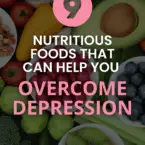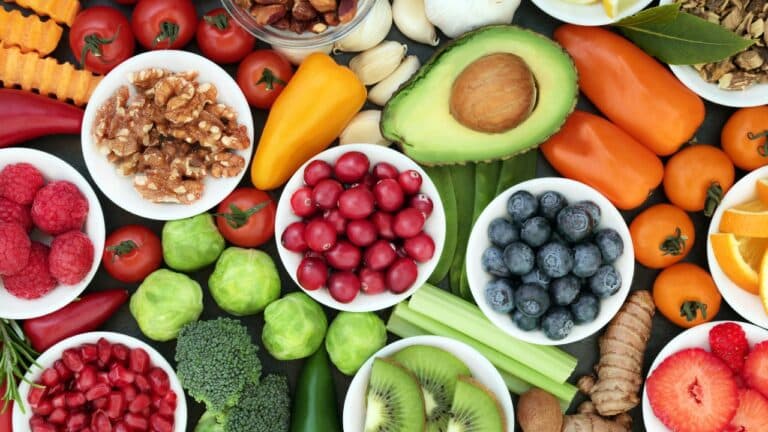
When you’re navigating depression, it’s crucial to remember that your diet can play a significant role in your mental health. Eating a nutritious, balanced diet can not only boost your overall physical health but also influence your mood and energy levels.
While food alone can’t cure depression, certain foods can help manage its symptoms and improve your well-being. So, let’s dig into nine nutritious foods that can help you dig out of depression.
The Role of Nutrition in Mental Health
Understanding the connection between diet and mental well-being can empower us to make food choices that enhance our overall health and help manage depression. Our brains require a constant supply of nutrients to function properly and what we eat can significantly affect how we feel.
Nutrient-Rich Diet and Brain Health
The brain, an energy-intensive organ, consumes a large portion of the body’s energy resources. It relies on a constant supply of nutrients from our diet. When the brain receives high-quality nutrition, it can carry out its functions more efficiently, which positively influences our mental health.
Certain nutrients, like Omega-3 fatty acids, are crucial for brain health and function. Omega-3s are essential components of the outer layer of brain cells – the cell membrane, which plays a vital role in transmitting signals between brain cells. Low levels of these fats in the body have been associated with a variety of mental health issues, including depression.
The Impact of Sugar and Processed Foods
On the flip side, diets high in processed foods and sugar can have detrimental effects on brain health. They cause blood sugar spikes and crashes that can lead to mood swings and energy dips. They also lead to inflammation and oxidative stress, which can damage brain cells and negatively impact mood and cognition.
Research has shown a strong link between a diet high in refined sugars and impaired brain function, including a worsening of symptoms of mood disorders, such as depression.
The Gut-Brain Axis
The gut-brain axis, the bidirectional communication between the brain and the gut, also plays a significant role in mental health. What we eat influences our gut microbiota, and these bacteria produce substances that can influence brain health.
A balanced diet promotes a healthy gut microbiota, which in turn produces beneficial substances like short-chain fatty acids and certain neurotransmitters that the brain uses for healthy function. Some research has even shown that a healthier gut microbiota is associated with a lower risk of depression.
The role of nutrition in mental health is complex and multifaceted. A balanced, nutrient-dense diet can support brain health and mood regulation, while a poor diet can exacerbate symptoms of depression. It’s essential to remember that while a healthy diet can support mental health, it’s not a cure-all and professional help should be sought if depression is affecting your quality of life.
Related: 8 Steps to Building a Support Network to Pull Yourself Out of Depression >>
9 Nutritious Foods to Include in Your Diet
1. Fatty Fish:
Omega-3 fatty acids, found in fish like salmon, mackerel, and sardines, are essential fats our bodies can’t produce themselves, and thus must get from our diet. These fats are crucial for brain health and have been shown to decrease the risk of depression, partly because they can easily travel through the brain cell membrane and interact with mood-related molecules inside the brain.
2. Dark Leafy Greens:
Dark leafy greens like spinach, kale, and Swiss chard are packed with folate, a type of B vitamin that affects neurotransmitters that impact mood. It’s been noted that people with depressive disorders often have lower levels of folate in their bodies. Including these leafy greens in your diet can help maintain a healthy level of this nutrient.
3. Berries:
Berries, like strawberries, blueberries, and raspberries, are rich in antioxidants, which help reduce inflammation. Chronic inflammation can affect the immune system and brain, leading to symptoms of depression. Berries are a delicious way to keep inflammation at bay.
4. Nuts and Seeds:
Nuts like almonds, walnuts, and seeds like chia, flaxseeds are not only rich in protein and healthy fats but also have high levels of magnesium. Magnesium plays a key role in the development of serotonin, which is a major contributor to feelings of happiness.
5. Beans and Lentils:
Beans and lentils are excellent sources of complex carbohydrates, which help regulate blood sugar levels, reducing energy dips and mood swings. They’re also packed with B vitamins, which can help improve mood by increasing levels of serotonin and dopamine.
Related: 10 DIY Cognitive-Behavioral Techniques to Help Undepress Yourself >>
6. Avocados:
Avocados are rich in monounsaturated fat, a ‘good’ fat that helps maintain healthy blood flow and brain health. They also contain tryptophan, a precursor to serotonin, known as the ‘feel-good’ neurotransmitter.
7. Probiotic-Rich Foods:
Foods like yogurt, sauerkraut, and kefir are rich in probiotics. These beneficial bacteria not only keep your gut healthy but also influence brain health via the gut-brain axis – the biochemical signaling that occurs between the gastrointestinal tract and the central nervous system.
8. Whole Grains:
Whole grains are good sources of complex carbohydrates, which help stabilize blood sugar levels, preventing mood swings. They also help the brain absorb amino acids more effectively, aiding in the production of mood-regulating neurotransmitters.
9. Lean Protein:
Lean proteins, such as chicken, turkey, eggs, and tofu, contain high amounts of the amino acid tryptophan, which is converted into serotonin in our bodies. Higher levels of serotonin can help to reduce symptoms of depression, improve mood, and promote restful sleep.
Final Thoughts
The battle against depression is a personal journey, unique to each individual. It’s a journey that can be incredibly tough, but it’s essential to remember that you’re not alone. No matter how isolated or overwhelmed you may feel, there are strategies and resources to help you dig, pull, and lift yourself out of the trenches.
Food plays an enormous role in our mental health. Our dietary choices can significantly influence our mood, energy levels, and overall brain health. Incorporating nutrient-rich foods such as fatty fish, dark leafy greens, berries, nuts, seeds, beans, lentils, avocados, probiotic-rich foods, whole grains, and lean proteins into your diet can make a world of difference. However, diet alone is not a silver bullet. It is one piece of a multi-faceted approach to managing depression.
Remember, building a support network is crucial. Reach out to friends and family, join support groups, engage with your community. You don’t have to go through this alone. Physical activity, another critical component of a holistic approach to depression, has profound effects on mood and mental health. Incorporate activities you enjoy into your routine and stay active.
Professional help is essential in many cases. If you’re struggling, reach out to healthcare providers. Mental health professionals can provide the necessary guidance, treatment plans, and support that can be invaluable in managing depression.
As we conclude, remember this: every step, no matter how small, is a step in the right direction. It’s the accumulation of small changes that make a big difference. It’s okay to have bad days, it’s okay to stumble, what’s important is that you keep going.
Depression is a heavy burden to bear, but with the right tools and support, it’s a burden that can be lightened. Keep fighting, keep pushing, and remember, you are stronger than you think. Always.
Resources
If you’re feeling suicidal or need immediate help, please reach out to a trusted professional or contact a crisis line like the National Suicide Prevention Lifeline at 1-800-273-TALK (1-800-273-8255) or use the Crisis Text Line by texting HOME to 741741.
For more information on diet and mental health, consider resources like the Mayo Clinic or the American Psychological Association. For depression and mental health resources, websites like the National Institute of Mental Health or the Depression and Bipolar Support Alliance can be helpful.
















